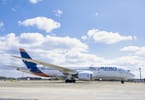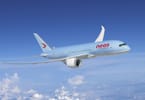Airlines’ revenue from international first- and business-class tickets fell by as much as 40 percent in the first quarter as the recession prompted carriers to cut fares, the industry’s biggest trade group said.
The number of premium-class passengers in March dropped 19 percent from a year earlier, the same rate of decline for the entire quarter, the International Air Transport Association said in an e-mailed statement today. That compares with an 8.2 percent fall in economy-class travelers.
“With premium fares falling faster than economy, due to the pressure from rapidly declining load factors, revenues have been hit much more than passenger numbers,” the Geneva- and Montreal-based group said.
Gross domestic product in countries using the euro shrank by 2.5 percent in the first quarter from the fourth quarter, the fastest pace in at least 13 years, while the U.S. economy contracted at a 6.1 percent annual rate. IATA estimated on March 24 that airline losses worldwide could total $4.7 billion this year, almost 90 percent wider than a forecast in December, as the deepening recession wipes out $63 billion of revenue.
A decline in premium-class traffic hurts airlines such as Singapore Airlines Ltd., which gets about 40 percent of revenue from that section of the planes. Sydney-based Qantas Airways Ltd. said on April 27 that it may enlarge economy cabins after premium-class sales fell 30 percent. As many as 40 percent of the seats on Qantas’s Boeing 747-model planes are business- and first-class.
‘Underlying Acceleration’
The industrywide decline in premium passengers slowed in March from a 21 percent drop in February, IATA said. At the same time, there was an “underlying acceleration” in the decline after adjusting for the annual move in Easter holidays, which shifted to April this year from March in 2008, it said.
“Unlike air freight, we have not yet reached a floor to the fall in air travel,” the organization said.
The biggest declines were posted within the Asia-Pacific market and on long-haul routes serving the region, IATA said. Some “tentative signs” of stabilization on premium traffic were reported on routes across the Atlantic and within Europe.
IATA is forecasting that passenger traffic will drop by 5.7 percent and cargo traffic by 13 percent this year. The group will update the outlook in early June at its annual conference in Kuala Lumpur.
WHAT TO TAKE AWAY FROM THIS ARTICLE:
- The number of premium-class passengers in March dropped 19 percent from a year earlier, the same rate of decline for the entire quarter, the International Air Transport Association said in an e-mailed statement today.
- At the same time, there was an “underlying acceleration” in the decline after adjusting for the annual move in Easter holidays, which shifted to April this year from March in 2008, it said.
- The industrywide decline in premium passengers slowed in March from a 21 percent drop in February, IATA said.






















